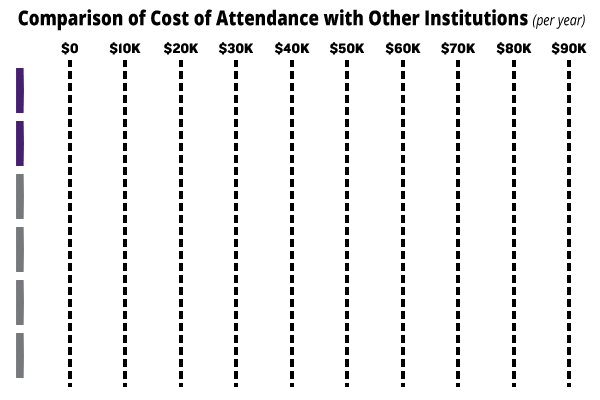Investing in your future as a chiropractor
Our financial-aid professionals will help you understand the costs of a Palmer degree. Palmer College is a great value, and we’ll make every effort to help you afford your educational costs.
You’ll find estimated annual tuition, fees, books, supplies and living expenses below. We’re assuming a modest but adequate standard of living. Your costs may not be the same as the averages outlined below.
See how Palmer stacks up.
Palmer College offers a competitive cost of attendance compared to other chiropractic schools. Plus, Palmer College awards approximately $4 million in scholarships every year, further offsetting the cost of attendance.

Doctor of Chiropractic Program Tuition and Cost of Attendance
Palmer Main Campus
2024-2025 Tuition
Terms 1-7:
16-21 credit hours: $13,416 per trimester
Less than 16 credit hours: $839 per credit hour
Over 21 credit hours: $13,416 plus $839 per credit hour for credits above 21
Terms 8-10:
Students registered for clinic practicum courses are charged a flat rate for the clinic practicum course and $839 per credit hour for each non-clinic practicum course.
Clinic Practicum tuition is:
Clinic II: $10,060
Clinic III: $10,060
Clinic IV: $12,577
Estimated per-term cost of attendance for the 2024-2025 year
| Tuition | $13,416 |
| Institutional Fees | $20 |
| Books, course materials, supplies and equipment | $480 |
| Transportation | $1,465 |
| Miscellaneous personal expenses | $2,245 |
| Housing and food | $4,510 |
| Federal student loan fees | $342 |
| Total per trimester: | $22,478 |
Palmer Florida
2024-2025 Tuition – Quarters
16-21 credit hours: $10,161 per quarter (13-quarter program)
Cost per credit: $635
Estimated per-term cost of attendance for the 2024-2025 year
| Tuition | $10,161 |
| Institutional Fees | $20 |
| Books, course materials, supplies and equipment | $321 |
| Transportation | $1,329 |
| Miscellaneous personal expenses | $2,124 |
| Housing and food | $5,056 |
| Federal student loan fees | $408 |
| Total per quarter: | $19,419 |
Total: $19,419 per quarter
2024-2025 Tuition – Trimesters*
Terms 1-7:
16-21 credit hours: $13,416 per trimester
Less than 16 credit hours: $839 per credit hour
Over 21 credit hours: $13,416 plus $839 per credit hour for credits above 21
Terms 8-10:
Students registered for clinic practicum courses are charged a flat rate for the clinic practicum course and $839 per credit hour for each non-clinic practicum course.
Clinic Practicum tuition is:
Clinic II: $10,060
Clinic III: $10,060
Clinic IV: $12,577
Estimated per-term cost of attendance for the 2024-2025 year
| Tuition | $13,416 |
| Institutional Fees | $20 |
| Books, course materials, supplies and equipment | $476 |
| Transportation | $1,720 |
| Miscellaneous personal expenses | $2,745 |
| Housing and food | $6,895 |
| Federal student loan fees | $400 |
| Total per trimester: | $25,672 |
*Palmer Florida transitioned to a trimester schedule in October 2022.
Palmer West
2024-2025 Tuition
16-21 credit hours: $10,016 per term (13-quarter program)
Cost per credit: $626
Estimated per-term cost of attendance for the 2024-2025 year
| Tuition | $10,016 |
| Institutional Fees | $20 |
| Books, course materials, supplies and equipment | $112 |
| Transportation | $1,364 |
| Miscellaneous personal expenses | $1,830 |
| Housing and food | $6,188 |
| Federal student loan fees | $427 |
| Total per quarter: | $19,957 |
Bachelor of Science, General Science – Main Campus Only
2024-2025 Tuition
Estimated per-term cost of attendance for the 2024-2025 year
Cost per credit: $260
| Tuition | $3,120 |
| Institutional Fees | $20 |
| Books, course materials, supplies and equipment | $625 |
| Transportation | $1,465 |
| Miscellaneous personal expenses | $2,245 |
| Housing and food | $4,510 |
| Federal student loan fees | $31 |
| Total per trimester: | $12,016 |
Nonrefundable fees
- Application fee: $50
- Evaluation fee: $100
- Graduation and record fee: $100
General Fees – All Degree Programs
General Fees
- Payment of delinquent tuition 12% (APR service fee on monthly unpaid balances)
- Checks returned from the bank for insufficient funds: $25
- Duplicate diploma: $30
- Transcript fee $5 per transcript*
Our refund policy can be found in the student handbook.
*Transcripts cover only courses taken at the Palmer College of Chiropractic campuses
Additional fees for the Doctor of Chiropractic Degree program
- Application fee (one- time): $100
- Tuition deposit: $200
- Matriculation fee: $150 (one-time)
- Activity fee (per term): $20
- Liability insurance (one-time charge as a student enters clinical coursework): $245
Elective/Clinical Enrichment Program Fees:
- $252 per course (Trimesters) or $163 per course (Quarters)
- McKenzie elective: $450
- Select Functional Movement Assessment Elective: $475
- Drop fee: $10 if dropped 22 days or more from first scheduled class date
- Drop fee: $50 if dropped 21 days or less from first scheduled class date
Books and Equipment
During each academic term, students are required to purchase textbooks that will be used throughout the academic program. Each student needs to purchase equipment that will serve the student doctor in the clinical portion of the academic program. The cost of books and equipment varies depending on term in school and where the book/supply is purchased from.
Personal Checks
Palmer doesn’t provide check-cashing services. Checks can be written for tuition, fees and bookstore purchases. A fee of $25 will be made for the first check returned by the bank for insufficient funds. If a second check is returned, it’s possible that future payments must be made with currency or certified funds.
Library Fines
Overdue books from the Library are subject to a fine. Check with the Library staff on your campus to determine the fine.
Fines
Fines will be posted to the student’s account and a hold will be placed on registration/graduation until payment is made. Pay outstanding fines at the Student Administrative Services Office.
Additional Information on Cost of Attendance (COA) and Budget Adjustments
Books, course materials, supplies, and equipment:
- Students will be provided a reasonable allowance (determined by the institution annually) for the upfront purchase of a personal computer required by the program.
- Students may request an allowance for the subsequent purchase of a personal computer through the professional judgment process with proof of payment.
- Students will be provided a reasonably allowance (determined by the institution annually) for the upfront purchase of specialized diagnostic equipment required by the program. Proof of payment is not required.
Living expenses:
- Students living in -on or -off campus housing, students living at home with parents, and students with or without dependents are provided the same standard allowance for food and housing and miscellaneous personal expenses.
- Palmer does not provide a meal plan option for students.
- A student must be enrolled at least half time (6 credit hours) for food, housing, and miscellaneous personal expenses to count in the student’s COA.
Dependent care:
- Students will be provided an allowance for the estimated actual expenses incurred for dependent care, based on the number and age of such dependents.
- Such allowance may not exceed the reasonable cost in the community in which the student resides for the kind of care provided (determined by the institution annually).
- The period for which dependent care is required includes, but is not limited to, class-time, study-time, field work, internships, and commuting time.
- Please see the Dependent Care Budget Adjustment Policy for more information.
Disability-related expenses:
- Students will be provided an allowance for expenses associated with a student’s disability, including special services, personal assistance, transportation, equipment, and supplies that are reasonably incurred and provided for by other agencies.
- Please see the Disability-related Budget Adjustment Policy for more information.
Professional licensure, certification, or a first professional credential:
- Students will be provided an allowance for the cost(s) associated with obtaining a state license through the National Board of Chiropractic Examiners (NBCE) in the term and/or year in which they could qualify to take the given exam. A student is eligible to receive an additional allowance for up to one (1) retake of Parts I, II, III, PT and/or IV with documentation of the expense.
- Please see the Professional Licensure Budget Adjustment Policy for more information.
Professional judgement (PJ)
- Special circumstances refer to the financial situations that justify an aid administrator adjusting data elements in the COA or in the EFC calculation.
- Unusual circumstances refer to the conditions that justify an aid administrator making an adjustment to a student’s dependency status based on a unique situation more commonly referred to as a dependency override.
- A student may have both a special circumstance and an unusual circumstance and may pursue both.
- Please see the Professional Judgment Policy for more information on the process, requirements, and reasonable timeline to review PJ requests.

